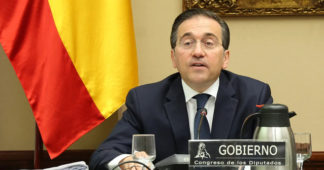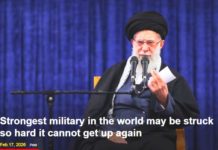Seven European nations urge Israel to ‘reverse its current policy’ on Gaza
Israel has halted the entry of food, medication and all other essentials into the Palestinian territory since March 2.
May 17, 2025
A group of seven European nations has called for an end to Israel’s military assault and blockade of Gaza, as the United Nations aid chief says time should not be wasted on an alternative United States-backed proposal to deliver aid to the Palestinian territory.
In a joint statement late on Friday, the leaders of Iceland, Ireland, Luxembourg, Malta, Slovenia, Spain and Norway said they “will not be silent in front of the man-made humanitarian catastrophe that is taking place before our eyes in Gaza” as Israel’s blockade has prevented the delivery of humanitarian aid for two and a half months.
“We call upon the government of Israel to immediately reverse its current policy, refrain from further military operations and fully lift the blockade, ensuring safe, rapid and unimpeded humanitarian aid to be distributed throughout the Gaza strip by international humanitarian actors,” the statement read.
“More than 50,000 men, women, and children have lost their lives. Many more could starve to death in the coming days and weeks unless immediate action is taken,” it said.
Meanwhile, the Council of Europe, a body that works to safeguard human rights and democracy, also noted that Gaza was suffering from a “deliberate starvation” and warned that Israel was sowing “the seeds for the next Hamas” in the territory, referring to the Palestinian armed group.
“The time for a moral reckoning over the treatment of Palestinians has come – and it is long overdue,” said Dora Bakoyannis, rapporteur for the Middle East at the Parliamentary Assembly of the Council of Europe.
The European calls came hours after UN aid chief Tom Fletcher said 160,000 pallets of relief and 9,000 trucks were ready to enter Gaza.
Continue reading at: Seven European nations urge Israel to ‘reverse its current policy’ on Gaza | Israel-Palestine conflict News | Al Jazeera
Spain PM calls for ‘pressure on Israel to halt the massacre in Gaza’
Published: 17
Spanish Prime Minister Pedro Sánchez called on Saturday for pressure to stop Israel’s “massacre in Gaza” and said Madrid plans a UN resolution requesting a world court ruling on aid access to the Palestinian territory.
Sánchez told an Arab League summit in Baghdad that the war triggered by Hamas’s October 2023 attack on Israel has led to “unacceptable numbers” of victims in Gaza, violating the “principle of humanity.”
“The extremely grave humanitarian crisis Gaza has endured since October 2023 has caused more than 50,000 dead, 100,000 wounded and two million displaced,” said Sánchez, who has sharply criticized the Israeli offensive.
World leaders should “intensify our pressure on Israel to halt the massacre in Gaza, particularly through the channels afforded to us by international law,” he said.
The Socialist prime minister said Spain will “submit to the United Nations General Assembly a proposal to ask the International Court of Justice to rule on Israel’s compliance with its international obligations on humanitarian aid access to Gaza,” under a complete aid blockade since March 2.
Sánchez said Spain would also back another draft UN resolution calling on Israel to “end the humanitarian blockade” and guarantee “full and unrestricted access for humanitarian aid” to enter Gaza.
Continue reading at: Spain PM calls for ‘pressure on Israel to halt the massacre in Gaza’
Spanish prime minister on Israel: ‘We don’t trade with a genocidal state’
All Israel News Staff
Published: May 16, 2025
During a session of Spain’s Parliament on Wednesday, Spanish Prime Minister Pedro Sánchez referred to Israel as “a genocidal state.”
Prime Minister Sánchez made his remarks in response to accusations from a Member of Parliament, Gabriel Rufián.
Criticizing Sánchez, Rufián said that the Spanish government, by trading with Israel, was supporting a state that is committing genocide.
Rather than disagreeing with Rufián’s accusation against Israel, Sánchez indicated that the Spanish government is not trading with this “genocidal state.”
“I’ll clarify one thing, Mr. Rufián,” he said. “We don’t trade with a genocidal state. We don’t. I believe I explained from this platform the other day what we’re talking about, when some statements were made that weren’t true.”
The Israeli Foreign Ministry responded to Sánchez’s remarks by summoning the Spanish ambassador for a “reprimand meeting.”
Continue reading at: Spanish prime minister on Israel: ‘We don’t trade with a genocidal state’ | All Israel News
Iberian mysteries (the Spanish blackout)
By Dimitris Konstantakopoulos
05/05/2025
It’s unprecedented. In two European countries—both EU and NATO members—electricity was suddenly cut off. Two more countries, France and Morocco, were also affected by the blackout. Life came to a standstill in the two countries most heavily impacted: passengers were trapped in trains, airports plunged into chaos, and in Spain alone, the estimated damages could reach 800 million euros.
This is no small matter, nor has anything like it ever happened before—a total blackout in two countries and partial outages in two others. To this day, no one has offered a satisfactory explanation of what happened—or even a plausible hypothesis as to how such an “accident” could occur, if it was indeed an accident. Of course, as always, some are quick to use the incident to promote their own narratives. The left blames privatization—and indeed, new private owners are more interested in boosting profits than in raising costs by investing in network security. Nuclear energy advocates seized the moment to argue that the reduced share of nuclear power in the national energy mix is to blame. The far-right points fingers at renewable energy—that’s their go-to grievance. But none of them are offering strong arguments.
After all, we live in an age of irrationality, fanaticism, and Manichaeism—where loud voices abound, but evidence and reasoning are in short supply.
But if it wasn’t a mysterious accident, then it was a cyberattack, carried out with a “shock and awe” strategy. If such a scenario is accurate, then welcome to the brave new world of cyberwarfare.
The Spanish leadership has, of course, categorically denied this possibility—so categorically that it seems unwilling to even begin the search for a culprit, possibly fearing the complications that might arise. After all, how can one categorically deny such a possibility when the exact cause of the incident remains unknown? Still, the government failed to convince even the country’s Supreme Court, which ordered an investigation into the possibility of a cyberattack, leaving nothing off the table. This is also the approach taken by Spain’s intelligence agencies, including the National Cryptology Center and the National Intelligence Center.
The possibility of a cyberattack was taken seriously enough to make headlines in major international media outlets. “No evidence of cyberattack,” was the title chosen by The Guardian. But that could just as well be read in reverse: “No evidence that it wasn’t a cyberattack.” If the possibility was not serious, it wouldn’t have been discussed—let alone featured on front pages.
The most likely scenario is that we’ll never know with certainty what really happened. And if we never find out, that may be precisely because what happened is too important to be disclosed.
Two suspects
If it was a cyberattack, then who might have been responsible? Politico, a thoroughly mainstream and well-informed media outlet with major influence in the West, identifies two possible culprits: Israel and Russia. As it wrote: “Spain’s opposition to Israel’s war in Gaza and its support for Ukraine against Russia’s invasion have made it a major target for cyberattacks.” https://www.politico.eu/article/spain-portugal-power-blackouts-energy-electricity/
The reference to Israel is bold and unusual by current Western standards, where even the slightest criticism of this country often leads to swift accusations of antisemitism and public condemnation. On the other hand, while it can’t be ruled out entirely, the scenario of a Russian cyberattack seems unlikely. It is true that Spain has followed NATO’s general anti-Russian stance, but its role in the Ukraine conflict has been secondary. It is not among the countries most aggressively pushing now for the continuation of the NATO war. It is governed by a coalition of Socialists and the radical left—the latter having many reservations about Ursula von der Leyen’s program of mass European rearmament. If Moscow wanted and was able to strike, one might wonder what it would gain by targeting Spain — why not attack the UK, France, Germany, the Baltics or Ukraine itself?
Continue reading at: Iberian mysteries (the Spanish blackout) | Defend Democracy Press
We remind our readers that publication of articles on our site does not mean that we agree with what is written. Our policy is to publish anything which we consider of interest, so as to assist our readers in forming their opinions. Sometimes we even publish articles with which we totally disagree, since we believe it is important for our readers to be informed on as wide a spectrum of views as possible.











